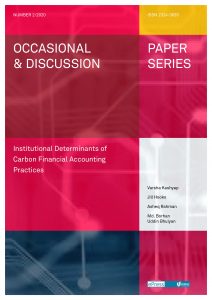 This paper investigates how and why firms affected by Emissions Trading Schemes (ETSs) are financially accounting for carbon in a voluntary setting. Using institutional theory, the authors seek to identify the determinants of a firm’s decision to adopt a particular carbon financial accounting practice. We identify the recognition and measurement practices for carbon-emission allowances using data gathered from the annual reports of ETS-affected firms in Australia. These practices are identified in the five stages of carbon-emission allowance transactions, namely, when these are: (1) received for free, (2) purchased, (3) used, (4) sold, and (5) surrendered. Inconsistencies in carbon financial accounting practices are observed. The findings reveal that carbon-emission allowances are recorded as intangible assets, but most firms provide incomplete information on their carbon financial accounting practices. Firms also exhibit inconsistencies in specifying how they are ‘recognising’ and ‘measuring’ carbon-emission allowances. The results provide evidence of coercive (regulation) and mimetic (size, leverage, and listing status) pressures being the main determinants of carbon financial accounting practice.
This paper investigates how and why firms affected by Emissions Trading Schemes (ETSs) are financially accounting for carbon in a voluntary setting. Using institutional theory, the authors seek to identify the determinants of a firm’s decision to adopt a particular carbon financial accounting practice. We identify the recognition and measurement practices for carbon-emission allowances using data gathered from the annual reports of ETS-affected firms in Australia. These practices are identified in the five stages of carbon-emission allowance transactions, namely, when these are: (1) received for free, (2) purchased, (3) used, (4) sold, and (5) surrendered. Inconsistencies in carbon financial accounting practices are observed. The findings reveal that carbon-emission allowances are recorded as intangible assets, but most firms provide incomplete information on their carbon financial accounting practices. Firms also exhibit inconsistencies in specifying how they are ‘recognising’ and ‘measuring’ carbon-emission allowances. The results provide evidence of coercive (regulation) and mimetic (size, leverage, and listing status) pressures being the main determinants of carbon financial accounting practice.
Kashyap, V., Hooks, J., Rahman. A., & Bhuiyan, M. B. U. (2020). Institutional Determinants of Carbon Financial Accounting Practices Unitec ePress Occasional and Discussion Papers Series (2020:2).
https://doi.org/10.34074/ocds.084
About this series:
Unitec ePress periodically publishes occasional and discussion papers that discuss current and ongoing research authored by members of staff and their research associates. All papers are blind reviewed. For more papers in this series please visit: https://www.unitec.ac.nz/epress/index.php/category/publications/epress-series/discussions-and-occasional-papers/
- Authors: Varsha Kashyap, Jill Hooks and Md. Borhan Uddin Bhuiyan
- Date of publication: 06.08.2020
- ISSN: 2324-3635